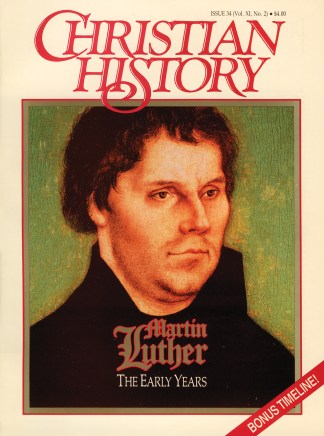"It has ever been my delight to learn or teach or write."
At age 7, Bede was given to the monks of Wearmouth Abby as an oblate. He never left. "From that time, I have spent the whole of my life within that monastery, devoting all my pains to the study of the Scriptures, and amid the observance of monastic discipline and the daily charge of singing in the church, it has ever been my delight to learn or teach or write."
Indeed: Bede completed some 40 works in his busy life, none more important than History of the English Church and Its People. Bede ranks not only as the first English historian, but also one of the best.
Hardest working man in the business
More specifically, the young Bede was given over to the care of the abbot Benedict Biscop, a learned man with refined tastes, who introduced Bede to the world of beauty and scholarship. Bede's love for church liturgy was cemented during an early tragedy, when all the monks but Benedict succumbed to the plague and Bede and his abbot alone labored together to continue the services until others could be sent to support them.
Timeline |
|
|
622 |
Muhammad's hegira: birth of Islam |
|
638 |
Jerusalem under Muslim domination |
|
663 |
Synod of Whitby |
|
673 |
The Venerable Bede born |
|
735 |
The Venerable Bede dies |
|
750 |
Donation of Constantine written about this time |
For the adult Bede, life was an continuous round of devotion and study. His fellow monks testify to his character, as one put it, "I can with truth declare that I never saw with my eyes or heard with my ears anyone return thanks so unceasingly to the living God."
Bede, for his part, only qualified his reputation as a hard working scholar: "I really don't work 'night and day,' but it is quite true that I do toil hard to reach a right judgment on all that I read."
Bede was a renaissance scholar: He wrote on grammar, mathematics, poetry, church music, rhetoric, and science, both for a general audience and for his own pupils. One of his students, Alcuin, went on to become an influential figure in the court of Charlemagne.
Still, it is his English history that is best known and most treasured today. His interest in the topic began with curiosity about the correct date to celebrate Easter, and Bede is the first historian to use the A.D. (from the Latin anno Domini, "in the year of our Lord") system of dating. His history ranges from 55 B.C. to A.D. 731, and without it, we would know little of the early centuries of Christianity in Britain, especially the history of Celtic Christianity, early missions to the Continent, and the definitive Synod of Whitby (during which the Celtic church submitted itself to Rome).
His thoroughness and accuracy are the book's strengths, and considering the limitations of the day, Bede's achievement is remarkable: he quoted some 144 separate works and no doubt consulted even more. He asked traveling monks to consult Vatican archives for him, and evidence came to him from many witnesses scattered over Europe. And he exhorted his copyists to preserve his citations—"since I do not want to be thought a thief in putting down as mine what is really theirs."
Though remembered as a historian, Bede's chief delight was in the study of Scripture. Four-fifths of his writings were on biblical interpretation. These include commentaries on the Pentateuch, the Gospels, Acts, and Revelation. On his deathbed he translated the Gospel of John from the Latin into English, which one English biblical scholar called the "opening scene of the … history of the English Bible."
He died on the floor of his cell where he regularly prayed, and just before he died, he was heard chanting the Gloria.
Corresponding Issue











